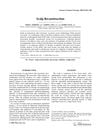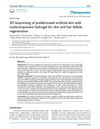 76 citations,
May 2007 in “Menopause International”
76 citations,
May 2007 in “Menopause International” After menopause, women lose a lot of skin collagen, but estrogen replacement might improve skin health.
 72 citations,
December 1983 in “Journal of Investigative Dermatology”
72 citations,
December 1983 in “Journal of Investigative Dermatology” Minoxidil helps hair cells live longer and grow longer.
 66 citations,
October 2006 in “Journal of Surgical Oncology”
66 citations,
October 2006 in “Journal of Surgical Oncology” Different scalp reconstruction methods work well, but the best one depends on the patient's unique needs.
 53 citations,
June 2017 in “Skin appendage disorders”
53 citations,
June 2017 in “Skin appendage disorders” PRP treatment helps hair growth in most cases, but more research needed.
 52 citations,
March 1979 in “Toxicology and Applied Pharmacology”
52 citations,
March 1979 in “Toxicology and Applied Pharmacology” Minoxidil can cause heart muscle damage in dogs.
 48 citations,
June 2020 in “Current Rheumatology Reports”
48 citations,
June 2020 in “Current Rheumatology Reports” Different types of fibroblasts play various roles in both healthy and diseased tissues, and understanding them better could improve treatments for fibrotic diseases.
 46 citations,
May 2012 in “Molecular and Cellular Endocrinology”
46 citations,
May 2012 in “Molecular and Cellular Endocrinology” Human skin produces sex hormones like estrogen and testosterone, influenced by ARO and StAR, which may affect skin elasticity and hair growth.
 44 citations,
October 2011 in “Gynecological Endocrinology”
44 citations,
October 2011 in “Gynecological Endocrinology” Menopause significantly reduces skin collagen, leading to thinner, less elastic skin, and hormone replacement may help but requires careful consideration.
 40 citations,
November 2009 in “Experimental Dermatology”
40 citations,
November 2009 in “Experimental Dermatology” The mineralocorticoid receptor may play a role in skin and hair health and could be a new target for treating related disorders.
 36 citations,
April 1990 in “Dermatologic Clinics”
36 citations,
April 1990 in “Dermatologic Clinics” Most pregnant women experience skin changes like darkening and stretch marks, and some may have skin conditions that usually get better after giving birth.
 27 citations,
January 2020 in “Experimental Dermatology”
27 citations,
January 2020 in “Experimental Dermatology” Immune cells affect hair growth and could lead to new hair loss treatments.
 22 citations,
June 2013 in “Australasian Journal of Dermatology”
22 citations,
June 2013 in “Australasian Journal of Dermatology” Early stage bald spots are linked to skin inflammation and damage to the upper part of the hair follicle.
 21 citations,
August 2011 in “Clinics in Dermatology”
21 citations,
August 2011 in “Clinics in Dermatology” Looking at skin can help find and treat serious diseases early.
 9 citations,
January 2017 in “Elsevier eBooks”
9 citations,
January 2017 in “Elsevier eBooks” Skin's epithelial stem cells are crucial for repair and maintenance, and understanding them could improve treatments for skin problems.
 6 citations,
September 2012 in “Clinical Interventions in Aging”
6 citations,
September 2012 in “Clinical Interventions in Aging” Honokiol might help reduce male skin aging by maintaining testosterone levels.
 3 citations,
December 2019 in “Journal of Cosmetic and Laser Therapy”
3 citations,
December 2019 in “Journal of Cosmetic and Laser Therapy” PRGF treatments increased hair number and thickness in people with hair loss, with more injections leading to better results.
 1 citations,
July 2015 in “Cytokine”
1 citations,
July 2015 in “Cytokine” Finasteride improves immune response and reduces organ damage after trauma hemorrhage in mice.
 1 citations,
January 2015 in “Journal of nutrition & health”
1 citations,
January 2015 in “Journal of nutrition & health” Fish oil improves skin health in people with diabetes and high cholesterol.
 February 2025 in “Theranostics”
February 2025 in “Theranostics” 3D bioprinting with special hydrogels can create artificial skin that heals wounds and regrows hair in mice.

Modern hair restoration techniques can effectively treat hair loss and provide natural-looking results.
 June 2012 in “Springer eBooks”
June 2012 in “Springer eBooks” Skin changes can indicate starvation and nutritional deficiencies in anorexia nervosa.
 183 citations,
January 2018 in “Cosmetics”
183 citations,
January 2018 in “Cosmetics” Essential oils in cosmetics can offer benefits but may cause allergies and should be used carefully.
 138 citations,
November 2015 in “Journal of Pharmacology and Experimental Therapeutics”
138 citations,
November 2015 in “Journal of Pharmacology and Experimental Therapeutics” Protoporphyrin IX is useful in cancer treatment but can cause health problems if not properly regulated.
 137 citations,
June 2005 in “Climacteric”
137 citations,
June 2005 in “Climacteric” Estrogen loss during menopause worsens skin health, but hormone replacement therapy may improve it, though more research is needed.
 125 citations,
September 2001 in “The FASEB Journal”
125 citations,
September 2001 in “The FASEB Journal” Stress can cause hair loss by negatively affecting hair follicles and this effect might be reversed with specific treatments.
 98 citations,
February 2007 in “Seminars in Cell & Developmental Biology”
98 citations,
February 2007 in “Seminars in Cell & Developmental Biology” Androgens can both stimulate and cause hair loss, and understanding their effects is key to treating hair disorders.
 81 citations,
May 2007 in “Fertility and Sterility”
81 citations,
May 2007 in “Fertility and Sterility” Testosterone therapy seems safe for postmenopausal women for a few years, but more research is needed for long-term effects.
 77 citations,
July 2013 in “Best Practice & Research in Clinical Obstetrics & Gynaecology”
77 citations,
July 2013 in “Best Practice & Research in Clinical Obstetrics & Gynaecology” Menopause reduces skin collagen and elasticity, and while estrogen therapy can help, its risks require careful consideration.
 69 citations,
January 2013 in “Frontiers in Immunology”
69 citations,
January 2013 in “Frontiers in Immunology” The FOXN1 gene is crucial for developing immune cells and preventing immune disorders.
 62 citations,
August 2014 in “BMC Endocrine Disorders”
62 citations,
August 2014 in “BMC Endocrine Disorders” New findings explain how genetic changes, body clocks, and certain molecules affect tissue response to stress hormones.






























